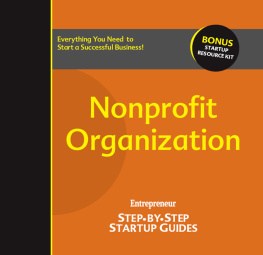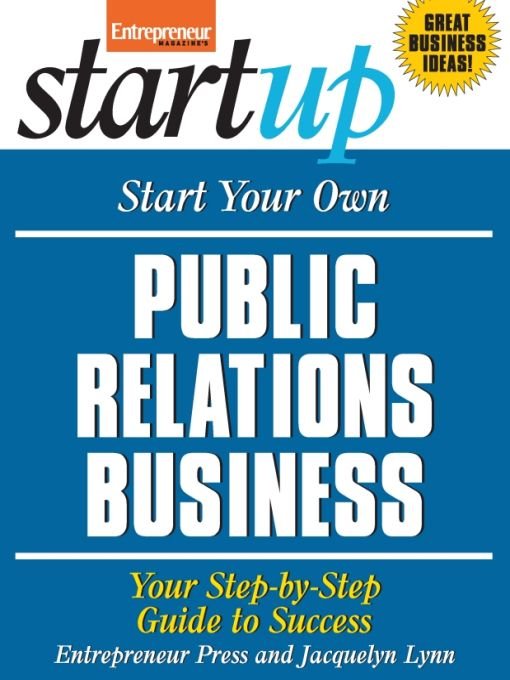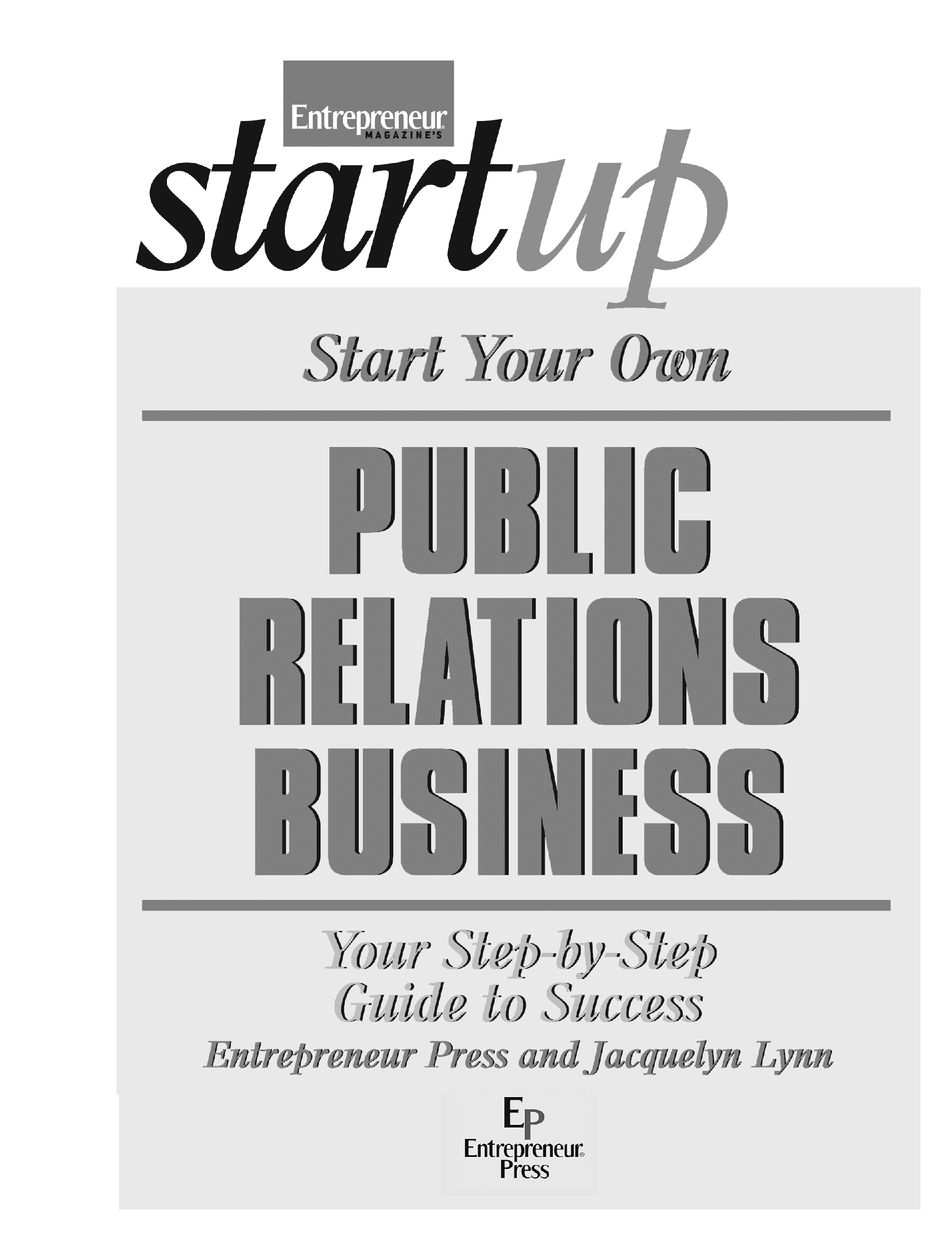Table of Contents
Additional titles in Entrepreneurs Startup Series
Start Your Own
Arts and Crafts Business
Bar and Club
Bed & Breakfast
Business on eBay
Business Support Service
Car Wash
Child Care Service
Cleaning Service
Clothing Store
Coin-Operated Laundry
Consulting
e-Business
e-Learning Business
Event Planning Business
Executive Recruiting Service
Freight Brokerage Business
Gift Basket Service
Grant-Writing Business
Home Inspection Service
Import/Export Business
Information Consultant Business
Law Practice
Lawn Care Business
Mail Order Business
Medical Claims Billing Service
Personal Concierge Service
Personal Training Business
Pet-Sitting Business
Restaurant and Five Other Food Businesses
Self-Publishing Business
Seminar Production Business
Specialty Travel & Tour Business
Staffing Service
Successful Retail Business
Vending Business
Wedding Consultant Business
Wholesale Distribution Business
Preface
Public relations: Good or bad, every company has them. Savvy businesses manage their public relationsand because they are experts in whatever product or service they provide, not in public relations, they will turn to a public relations expert to assist with this process.
Thats where public relations firms come in. Even companies large enough to have an internal public relations department often retain an outside firm as well.
Why do companies hire public relations firms? Many reasons:
A strong, well-planned PR campaign can help a business in a variety of ways that go straight to the bottom line in the form of increased sales and profits.
An outside agency will look at a company through fresh eyes, seeing public relations and promotional opportunities the owners and managers may miss.
Using an outside agency allows a company to focus on its core business rather than spending time, energy, and money trying to develop expertise in a new area.
An outside agency has the necessary skills, resources, and media contacts to develop and implement an effective PR campaign.
Public relations have always been critical to a companys success, but in the past, they were easier to manage. Back in the days when there were just three major television networks and few people had even heard of the internet much less thought about having a personal computer in their homes, managing the flow of information about companies and products was far less complicated than it is todayand than it will be in the future.
The explosion of media opportunities and the rapidly changing communications landscape are key drivers in the growth of the public relations industry. But theres much more to an effective public relations strategy than simply media, and companies are recognizing the need to be proactive when it comes to their image. According to the Council of Public Relations Firms, public relations spending will increase 11.8 percent to $4.26 billion from 2007 to 2011. The U.S. Department of Labors Bureau of Labor Statistics projects that employment in the public relations field will increase faster than average through 2012.
Its important to stress that this is not a manual on how to do PR, although we will discuss some specific strategies and techniques. This is a guide on how to set up your firm, how to choose your own market niche, how to acquire and maintain clients, and how to manage and grow your own company.
If youve been thinking about starting your own public relations firm, now is the time, and this book will walk you through the steps.
So What Is PR Anyway?
Public relations, or its abbreviation PR, is one of the more misused and even misunderstood terms in the business worldyet its a critical element in a companys marketing strategy. If youre going to operate a PR firm, you need not only to understand what that means, you must also be able to communicate it to your clients.
Public relations is the relationship a company or organization has with its various publics, and those publics include customers and potential customers, employees, suppliers, investors, the media, and the general public. Typically in business, the term public relations is used to refer to the management of public relations. As a public relations professional, your job is to help your clients with that process.
The process of public relations is one of helping an organization tell its story and build goodwill with the public and those who influence the public, such as the media. The ultimate goal of PR is credibility.
The Role of a Public Relations Professional
Successful public relations practitioners are able to see themselves and their clients from a variety of perspectives, including through the eyes of every public the organization has. PR professionals are pivotal to the communications process,ensuring that messages are clear, honest, unambiguous, easily understood, and appropriate for the target audience.
Some PR firms are primarily implementers, taking direction from clients without being involved in strategic planning. This narrow role is short-sighted on the part of the client because a skilled PR professional can provide far more value if he or she is involved in the entire public relations process. This means becoming an integral part of the clients team, learning the clients operation and goals, helping to put together a strategy that will take the client from where it is now to where it wants to be, and then assembling the necessary elements to implement and monitor the strategy, and make adjustments along the way when circumstances dictate.
Bright Idea
One of the best ways to learn the public relations business is to get a job with an agency. You can get paid while you learn the ropes. It will also give you a great perspective on how to treat your own employees later on.
Ethics and Responsibility
The power of public relations brings with it a tremendous amount of responsibility. Perhaps PR professionals should follow the principle medical students are taught: first, do no harm. History is full of examples of PR professionals who, either intentionally or not, used the public trust they cultivated to convey a message that turned out to be wrong.
The father of public relations, Edward L. Bernays (18921995), was the nephew of Sigmund Freud, which could be why he was able to incorporate an astute grasp of human behavior into his work for clients. His work should be studied by every PR professional today. Many of his campaigns are legendary, such as when he promoted Lucky Strike cigarettes during a time when women smoking in public was not acceptable by arranging for a parade of debutantes to march down Fifth Avenue while smoking. He is also credited with convincing America that a proper breakfast was more than just coffee and toast; it was bacon and eggs.







